•
•
•
•
•
To
plan our September 2023 “cluster reunion,” alumni from my
Oberlin College class of 1969 exchanged emails with alumni from the
classes of 1967 and 1968. Some of those messages reminisced
about our earliest experiences at that serious academic
institution. I've added yearbook photos from 55 years ago.
|
|
|
|
“While looking for something else, I came across this earlier today. It was given us (males of the Class of '67) one evening soon after we arrived on campus in the fall of 1963. We were led through the songs, and then we were led to the dorms where the rest of the class resided, where we did our best to sing.” |
|
The songs were ancient. No. 1 was a parody of a 19th-century minstrel song and No. 2 was written by a member of the Class of 1900. I can't identify No. 3, but as a non-athlete I can identify with this part: “A get-up-and-go-man, he may not always win the game, but Oberlin boys are bound for fame.” Then No. 4 was written by a member of the Class of 1907 and No. 5 by a local pastor in 1913.

 Carl
Brown '67 responded that “It brings back very vague memories...
and I wonder if it lasted for the '68 and '69 classes!”
Carl
Brown '67 responded that “It brings back very vague memories...
and I wonder if it lasted for the '68 and '69 classes!”
|
|
|
The actual title was “A Song of Victory” and it was intended to be sung by a celebrating “living stream” as they left the field like Coach John Heisman's undefeated 1892 squad. Nowadays my arthritic fingers won't let me do No. 2 justice on the piano, but here's the music to that fine old march from the 1946 Oberlin College Song Book. “Ev’ry breeze through the autumn trees now sets our colors flying.”
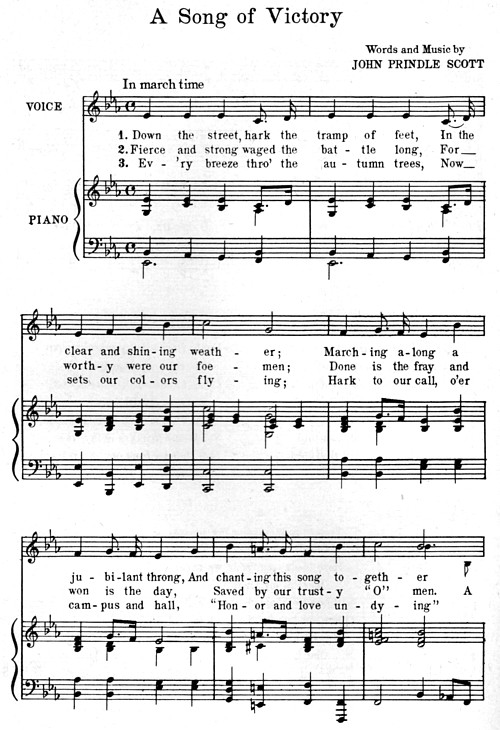

 Ted
Gest '68 added that he enjoyed Sing a Song of Colleges “because
my wife went to Northwestern, which is prominently mentioned with
Oberlin. But the whole thing is sexist, of course. What
did we know in 1964?”
Ted
Gest '68 added that he enjoyed Sing a Song of Colleges “because
my wife went to Northwestern, which is prominently mentioned with
Oberlin. But the whole thing is sexist, of course. What
did we know in 1964?”
(Ted recently wrote that in 1964 he travelled to Ohio by train, arriving in Wellington at night and then taking a shuttle to Oberlin. Shortly after he arrived at Burton Hall, there was an election to choose the dorm's representative. But by the next week, the students found that their representative had left the college. They then elected Ted as their representative — the first of his many leadership positions ranging from Editor of the Oberlin Review to Station Director of WOBC to various roles in Oberlin’s Alumni Association.)
 Bonnie
Wishne '69 wrote, “This raises a question I've had for a long
time. Were we freshmen women made to wear demeaning beanies for
the first two weeks of the school year, or did I dream that?”
Bonnie
Wishne '69 wrote, “This raises a question I've had for a long
time. Were we freshmen women made to wear demeaning beanies for
the first two weeks of the school year, or did I dream that?”
 Judy
Klavans '68 replied, “I don't have any recollection of
beanies. But this is not surprising; if we did have to wear
them, I'd have blocked that out of my mind. It's almost
horrifying to think of how we were expected to behave and think in
those days. Panty raids? Seriously??”
Judy
Klavans '68 replied, “I don't have any recollection of
beanies. But this is not surprising; if we did have to wear
them, I'd have blocked that out of my mind. It's almost
horrifying to think of how we were expected to behave and think in
those days. Panty raids? Seriously??”
 Liz
Jaffer Keys '68 confirmed, “Yes, beanies during Freshman
Orientation were required to be worn. Though I don't know the
consequences for those who took them off....”
Liz
Jaffer Keys '68 confirmed, “Yes, beanies during Freshman
Orientation were required to be worn. Though I don't know the
consequences for those who took them off....”
|
|
Beanies were among the collegiate hazing traditions from the early 20th century. These St. Thomas freshmen don't seem happy about it, but they had to wear their ridiculous felt hats until the end of the orientation period. |
|
At some schools, beanie-wearers had to stand for each upperclassman entering a room. At most schools (including Oberlin, I think), the tradition died out by 1970.
 Bonnie
Wishne ended it slightly sooner. “I didn't have a finely
honed political sense in those days, but I remember that, while
others were sticking pins in their beanies to ward off potential
thieves, I just thought it was stupid and took it off after a couple
of days. But it is so unreal now that I have literally wondered
in recent years if it really happened. Thank you for the confirmation.”
Bonnie
Wishne ended it slightly sooner. “I didn't have a finely
honed political sense in those days, but I remember that, while
others were sticking pins in their beanies to ward off potential
thieves, I just thought it was stupid and took it off after a couple
of days. But it is so unreal now that I have literally wondered
in recent years if it really happened. Thank you for the confirmation.”
 Chris Keys '68 added his recollections. “All these things
actually happened. Remember late minutes, three feet on the floor, etc?”
Chris Keys '68 added his recollections. “All these things
actually happened. Remember late minutes, three feet on the floor, etc?”
He's referring to parietal rules (“within the walls”), so called because they regulated behavior within college buildings. The school, assuming the legal responsibility of in loca parentis (“in place of a parent”), felt it had to perform some functions of the students' absent mothers and fathers — such as enforcing curfews for the under-21 daughters.
|
Men could visit women in student-union parlors or even in their personal dorm rooms, but only during certain times. And to discourage amorous hanky-panky, the door had to be kept open and the two people had to keep at least three of their four feet on the floor. |
|
 Dressed
for dinner and passing the milk, from the September 1964 Oberlin
College Bulletin
Dressed
for dinner and passing the milk, from the September 1964 Oberlin
College Bulletin
In the early years everyone “dressed for dinner.” A dining hall chaplain gave an invocation and read announcements, and Junior Residents dined with the freshmen.
An alumna from the previous decade, Kathy Kendall ’58, reminisced recently with friends at the Oberlin Club of Washington, D.C.
Kathy noted that orientation week was her first time in Oberlin. Her most vivid memory of that week is of her fellow students. Kathy came from a “family of talkers,” who talked a lot around the dinner table about American politics and whatever was going on in the world. She soon found that Oberlin was filled with “talkers on steroids.” At breakfast, lunch, and dinner at Talcott Hall, people talked and talked and talked, nonstop. And they listened, too. She “knew right away” that she had made the right choice.
 Lee Drickamer '67 remembered details of those evenings. “We
had one of the JRs at each table to maintain order. Then there
were food raffles for any extras on the serving trays from family
style dinners.”
Lee Drickamer '67 remembered details of those evenings. “We
had one of the JRs at each table to maintain order. Then there
were food raffles for any extras on the serving trays from family
style dinners.”
 Chris
Keys added, “We young men also had to wear ties and coats to
dinner, and the women likely had to wear dresses. It was a
different era, all right! But it didn't last much past our
first year. I doubt that the Class of '69 had to put up with
much of this stuff. Are any of you on this thread to confirm this?”
Chris
Keys added, “We young men also had to wear ties and coats to
dinner, and the women likely had to wear dresses. It was a
different era, all right! But it didn't last much past our
first year. I doubt that the Class of '69 had to put up with
much of this stuff. Are any of you on this thread to confirm this?”
 Mike Jarvis '69 replied, “I remember having to wear jackets and
ties to dinner at Dascomb.”
Mike Jarvis '69 replied, “I remember having to wear jackets and
ties to dinner at Dascomb.”
 “Oh,
yes," added Walt Galloway '69. “Freshman year in
Dascomb the ‘girls’ had to wear dresses or at least
skirts. Three feet on the floor in the ‘dating
parlors’ in Wilder. All gone by our sophomore year, as I
remember, in the dining hall; but the three feet lasted at least
through junior year.”
“Oh,
yes," added Walt Galloway '69. “Freshman year in
Dascomb the ‘girls’ had to wear dresses or at least
skirts. Three feet on the floor in the ‘dating
parlors’ in Wilder. All gone by our sophomore year, as I
remember, in the dining hall; but the three feet lasted at least
through junior year.”
 Bonnie
Wishne '69 remembered that during her first year, the women in her
class protested the parietal rules. How did they do that?
“There was an all-night sit-in at Burton (I think that was the
men's dorm). After that, I believe hours for women were ended
for our sophomore year.”
Bonnie
Wishne '69 remembered that during her first year, the women in her
class protested the parietal rules. How did they do that?
“There was an all-night sit-in at Burton (I think that was the
men's dorm). After that, I believe hours for women were ended
for our sophomore year.”
|
Ladies first? Sounds chivalrous, and a table of female friends could sit together. However, they had no choice as to which males would join them. As a guy, I could grab a seat next to a girl I fancied. |
|
Molly also recalled, “Maybe only Class of '67 remember ‘Saturday Night Calling Hours!’ Our freshman year, we women had to be in by 11pm Sunday through Thursday, Friday and Saturday by 12. Men had no hours. And women could stay out late our senior year, including all night; but if you were ‘away’ you had to leave a note in a sealed envelope re how to reach you if an emergency came up. Most of the notes said, ‘Ask my roommate.’ Clearly, the Sixties were a time of transition.”
 Edna
Chun '68 added, “I too recall this unfortunate practice....
Very sexist, and un-Oberlinian.”
Edna
Chun '68 added, “I too recall this unfortunate practice....
Very sexist, and un-Oberlinian.”
 Bernie
Mayer '68 commented, “The memories that are being shared are
painful reminders about how clueless we were about issues of gender,
among other things — and how clueless about being clueless.
Bernie
Mayer '68 commented, “The memories that are being shared are
painful reminders about how clueless we were about issues of gender,
among other things — and how clueless about being clueless.
“The song sheet seems like a metaphor. I remember singing (badly) ‘Down the Street’ but not the ‘Song of Colleges,’ which actually seems to glorify sexual harassment. I was involved in the negotiations that changed women's hours. In retrospect, I can't believe that the main argument raised at the time was against the in loco parentis patronizing policies of the college — and not against the out-and-out sexism of the policy. I think changes really occurred about this and other patriarchal policies when people just started ignoring them, as in the Burton sit-in.
|
“Does anyone remember what happened in the beginning of the spring semester of the 1964-65 school year when Harvey Baker '66, who was one of the two chaplains at Dascomb, showed up with a beard and was told to shave or resign as chaplain? “He chose the beard. Protests ensued. Change happened.” |
|
 Liz
Jaffer Keys '68 noted, “The fact that we didn't protest the
inequities between men's hours and women's hours, and also that men
had maid service and women didn't, was because there weren't
equity laws to base our concerns on. Our experiences and
awareness led to the equity laws! I tell young women that
my experiences of sexual discrimination and harassment as a graduate
student led to the laws they take for granted now! I'm sure we
all have many stories from that era.”
Liz
Jaffer Keys '68 noted, “The fact that we didn't protest the
inequities between men's hours and women's hours, and also that men
had maid service and women didn't, was because there weren't
equity laws to base our concerns on. Our experiences and
awareness led to the equity laws! I tell young women that
my experiences of sexual discrimination and harassment as a graduate
student led to the laws they take for granted now! I'm sure we
all have many stories from that era.”
 Judy
Klavans '68 added, “The review of where we were then is very
helpful. We all worked hard to recognize the issues, step up,
and do things differently. Times now are certainly not perfect
by any means (and don't even think about climate change), but we had
to step back and question fundamental assumptions. And we did.”
Judy
Klavans '68 added, “The review of where we were then is very
helpful. We all worked hard to recognize the issues, step up,
and do things differently. Times now are certainly not perfect
by any means (and don't even think about climate change), but we had
to step back and question fundamental assumptions. And we did.”
 Rich
Zitrin '68 wanted to end on an optimistic note. “I'd
prefer that instead of focusing on how clueless we were — all of
us! — we realize how much we've evolved in a relatively short
period of time.”
Rich
Zitrin '68 wanted to end on an optimistic note. “I'd
prefer that instead of focusing on how clueless we were — all of
us! — we realize how much we've evolved in a relatively short
period of time.”
 Sal
Barbatano '69 wrote, “I recall attending a reception for
freshmen our first week on campus. Men were required to wear
jackets and ties. I had my National Honor Society pin in the
lapel of my jacket. Bob Shay approached me, introduced himself,
pointed to my NHS pin, and said ‘Take that off.’ I
said ‘Why?’ He replied, ‘Because everyone here
has one.’”
Sal
Barbatano '69 wrote, “I recall attending a reception for
freshmen our first week on campus. Men were required to wear
jackets and ties. I had my National Honor Society pin in the
lapel of my jacket. Bob Shay approached me, introduced himself,
pointed to my NHS pin, and said ‘Take that off.’ I
said ‘Why?’ He replied, ‘Because everyone here
has one.’”

 Tom Gregory '67 recalled an attempt to initiate freshmen into the old
campus traditions lest they be forgotten.
Tom Gregory '67 recalled an attempt to initiate freshmen into the old
campus traditions lest they be forgotten.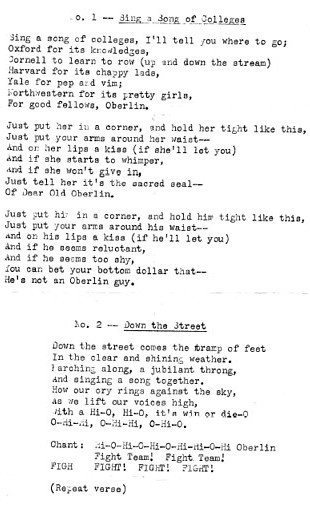
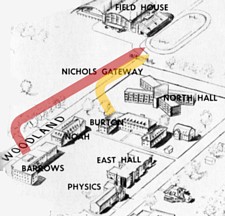

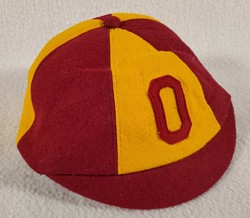
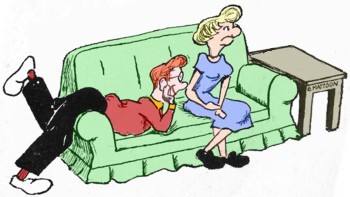
 But
during her senior year, said Molly Horst Raphael '67, “it was
still boy, girl, boy, girl, at the evening dinner at Talcott (then a
senior women's dorm). Girls went in first and sat every other
seat, boys followed!”
But
during her senior year, said Molly Horst Raphael '67, “it was
still boy, girl, boy, girl, at the evening dinner at Talcott (then a
senior women's dorm). Girls went in first and sat every other
seat, boys followed!”

